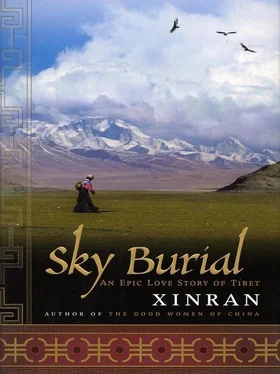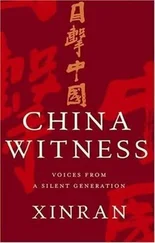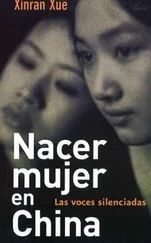“How did you learn to cook Chinese food?” asked Zhuoma in surprise.
“From you,” Tiananmen replied. “You told me how, when you came back from Beijing.”
“That’s impossible,” said Zhuoma. “I didn’t even know how to make tsampa then, let alone Chinese food.”
Tiananmen smiled. “But you talked to me about the Chinese dishes you ate in Beijing, and the taste of their stewed lamb. My father used to say, if you smell a horse’s dung, you can tell where it’s been grazing. If you taste barley wine, you can tell what the barley harvest was like. Didn’t you tell me that the Chinese cook mutton with sweet herbs, that it is tender and comes in a salty broth? So that is how I have made it.”
Both Zhuoma and Wen burst out laughing.
“You told me that he never asked questions,” Wen said to Zhuoma. “But he was certainly listening.”
Tiananmen’s mutton was delicious. Wen couldn’t recall having eaten anything flavored with those particular herbs, but she didn’t say so. She never found out exactly what he had used.
During the meal, Tiananmen said he had heard that more than a thousand people would come to watch the horseback opera the next day. They could use the opportunity to make inquiries about Wen’s husband. The three friends spent the evening in high spirits, as if sure that all their hopes would soon be realized. Wen went to sleep thinking of Kejun. Perhaps she would not need to travel to Lhasa. Perhaps the holy mountains would, after all, return to her what she had lost. In the night, the sound of the hermit singing drifted into her dreams. She and Kejun were following a great master, who was choosing mani stones for them on one of the holy mountains…
THE NEXT morning, crowds of people began to assemble on the hillside. Since the performance would take place on the plain, the slopes gave them a clear view of the action. Wen had seen nothing like this since the Dharmaraja ceremony at Wendugongba. She felt both fear and elation at the sight of so many people. She, Zhuoma, and Tiananmen arrived early, while the lamas were still painting their faces and preparing their costumes. Through the flaps in the actors’ tents they could make out many of the beautifully colored props. A few young men hung around the tents, trying on hats, helmets, and garlands. Other young people were dancing, singing, and waving colored flags. There was an atmosphere of high excitement.
With the sounding of a few notes on a simple stringed instrument, the performance began. Wen had been worried that she wouldn’t understand what was happening, but the stylized movements of the horseback actors made everything clear. The opera told the part of the legend where Gesar was sent down to earth by the bodhisattva Chenresig, who watched over the human world to rid mankind of evil spirits and demons, subdue all violence, and help the weak. The guardian spirit of the faith and the spirit of war accompanied Gesar into the world of men. Gesar won the horse race by which the ruler of the kingdom of Ling was chosen, and was given the title King Gesar and King of the Martial Spirits. Leading all the spirits, Gesar embarked on a military quest throughout the land, bringing peace and stability to the nation. This great task accomplished, the spirits flew back to the courts of heaven.
Wen thought the lamas looked like characters from the Peking Opera she had watched as a child in the teahouses of Nanjing, except they were mounted on horseback. Waving flags and banners, they rode out in various poses, producing strange shouts and roars. It all reminded Wen of the episode in The Journey to the West where Monkey King created havoc in heaven. Zhuoma stood at her side, quietly explaining the few parts that Wen couldn’t understand.
“This is the fight with the demon king.”
“That’s the king’s beautiful concubine praying for him.”
“That villain is his uncle Trothung, gloating from the sidelines.”
As she watched, Wen was full of admiration for the way in which the gestures of the actors were based on those of daily life. She was surprised that the actor-lamas, who lived enclosed in monasteries, could know these gestures so well. But perhaps there was not so much difference between the inside and the outside of a monastery. Increasingly, she was coming to understand that the whole of Tibet was one great monastery. Everyone was infused with the same religious spirit, whether they wore religious robes or not.
When evening came and the lamas had tethered their horses and packed up their costumes, the audience settled down around campfires, drinking barley wine and butter tea. Sheep were roasted whole over the bonfires and the smell wafted through the air as the fat spat and sizzled in the fire like fireworks.
Suddenly, there was a loud commotion and everyone rushed over to see what was going on. Someone called out for hot water and a menba.
Zhuoma squeezed into the crowd to listen to what was being said.
“A woman has gone into labor,” she told Wen. “It sounds as if she’s in trouble and her family is begging for help. Can you do anything?”
Wen hesitated. In all the years she had been in Tibet, she had hardly used her medical knowledge. The language barrier, the use of different herbs, the fact that Tibetans often relied on prayer when someone was seriously ill had rendered her hard-won knowledge useless. Would it be responsible for her now to claim she could help a difficult labor? Zhuoma saw her indecision.
“Come,” she said. “They are desperate. At least go and see.”
In a sparsely furnished tent lay a woman with an ashen face. Her whole body was shaking and streaked with blood. The baby’s head was showing, but the rest couldn’t emerge because the umbilical cord was wrapped around the neck. More dangerous still, the woman’s family was urging her to bear down and the baby was turning purple, strangled by the tightening umbilical cord.
Wen cried out to the woman that she should stop pushing. As she washed her hands, she yelled instructions at Zhuoma on how to assist her. Silenced and impressed by her decisiveness, the family just stood by and watched.
Wen carefully pushed the baby’s head back inside the mother’s body. She heard several sharp intakes of breath close by and she tried her hardest to remember the midwifery she had learned at medical school. For difficulties such as this, she needed gently to massage the womb. Zhuoma told everyone that she was a Chinese menba, that she was using Chinese methods of delivery to help them. Wen then gestured at the mother to push, and after a little while the baby emerged, slowly but surely. It was a healthy boy.
Surrounded by cries of excitement, Wen expertly cut the umbilical cord, drew out the afterbirth, and cleaned the woman’s lower body with a special medicinal wine that the family brought to her. Then she watched as, like the children of Om and Pad, the baby was given a special herbal broth to protect it from insect bites.
When Wen passed the father the swaddled child, he was afraid to hold him. Instead, he opened his robe and asked Wen to put the child inside for him. He was overcome with emotion. He told Wen and Zhuoma that they had longed for a child for many years, but their hopes had been dashed every time because of miscarriages or problems in labor.
“Now I know of a second Chinese menba who has done a good thing,” the man said.
Wen froze. “What do you mean?” she asked. “Have you met another Chinese doctor?”
“My father told me about one,” the man replied. “He said that, many years ago, a Chinese doctor was given a sky burial and, because of this, the fighting between Tibetans and Chinese in this area came to an end.”
Wen looked at Zhuoma. Her heart was pounding and she could hardly breathe.
Читать дальше












